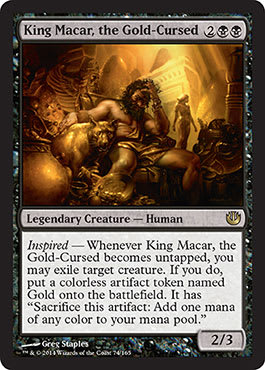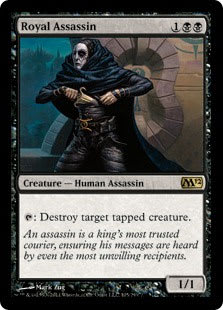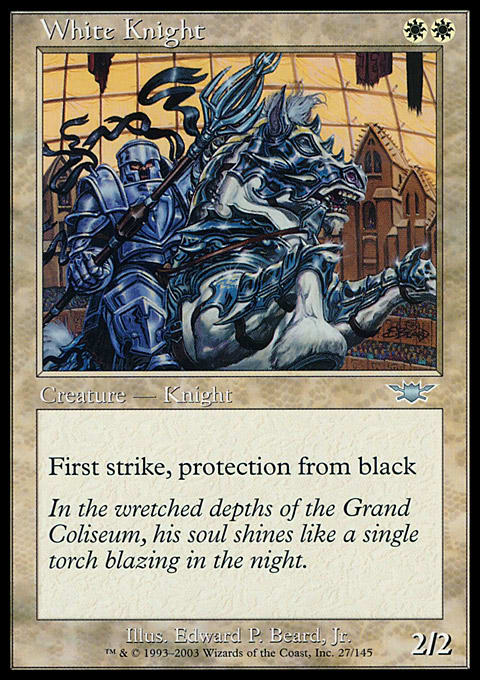I don’t normally have much interest in alternate formats beyond Commander. My preference has always been for free-for-all (FFA) multiplayer games, but my group in Seoul started playing a format called Kingdom some time ago, and it has become our default way of dealing with five or six players. The format is rock-solid, adding a lot to your games without taking much away, and most importantly, it is much faster than FFA, allowing more games per night. If you have at least five players, you should definitely give this fun format a try.
Getting Started
We started playing Kingdom after it was mentioned on CommanderCast in 2012. Also, The Stybs wrote about it in two articles last year under the name Usurper. That means I can tell how my group plays it, but there may be other versions of it out there. Kingdom is a role-based format, meaning that how you win depends on what your role is. To start with, we played a five-player game with four roles:
- King – The King wins by eliminating all other players; the King shares the win with the Knight.1
- Knight – The Knight wins by protecting the King; the Knight shares the win if the King survives, even if the Knight was eliminated.
- Bandits – Either Bandit wins by killing the King; if the King dies before any other player, the Bandits share the win.
- Assassin – The Assassin wins by eliminating all other players; the Assassin does not share the win with the Bandits.
Additional rules:
- All roles are secret except the King. They remain secret even after a player is eliminated.
- The King starts the game and has the highest life. (We play Commander Kingdom, wherein the King has 50 life, and it takes 26 commander damage to kill the King.)
You can assign the roles any way you like, but we’ve found that the easiest way is to use face-down land cards: one Plains, two Mountains, one Swamp, and one Forest correspond to the King, the Bandits, the Assassin, and the Knight. That keeps it fairly intuitive, as Kings feel white, Bandits feel red, and Assassins are black, right? Forests aren't inherently knightly, but green is white’s ally, so it’s pretty easy to remember the roles. Most guys just stash their role card under their play mats in case they forget.
You can even customize them if you like! My buddy Aaron made up these customized role cards:

King
Everyone except the Knight must die.
“I don’t trust any of you bastards.” |

Assassin
Kill everyone (the King must be last).
“Guys, seriously: Why do you always think I’m the assassin?” |

Knight
The King must survive, and everyone else dies.
“Don’t listen to these other assholes. I got your back.” |

Bandit
Kill the king.
“When in doubt, attack.” |

Bandit
Kill the king.
“Ah, fuck it. Attack the king.” |
Yes, that is me as the Assassin; apparently, I was voted Most Likely to Betray. The kicker is that when Aaron first unveiled these, I drew the Assassin without even noticing the art or flavor text, and I won that game, mainly on the strength of my ability to convince the King that this time I really was the Knight. When I finally took the time to read my role card, I LOLSHIWMed!
My buddy Paul has also been Bandit so often that he earned his own trading card; it’s one more example of the fun that this format can add.
Why It Works
Kingdom is a great format for a couple of reasons. First, the limited win conditions make for faster games. The Bandits have every incentive to go for broke and push the pace of the game, the King and Knight have to take out the Bandits as quickly as possible, and the Assassin has to become involved so that nobody suspects who he or she really is. Many games end as soon as the first royal personage is eliminated, and most games accelerate to an endgame very quickly once two players are out, so the kind of Mexican standoff that can lead to drawn-out FFA games is almost impossible in Kingdom.
The roles also add to the enjoyment of the game at a social level. When we started playing, everyone was getting into Game of Thrones, and so there was a lot of extra banter along the lines of:
“Well played, Your Grace!”
“I declare that all of my loyal subjects shall draw an extra card from the Bell of the Royal Temple”
“You dare strike our liege lord!? You shall pay dearly for such base treachery!!”
And the classic, “Interesting . . . that’s exactly what an Assassin would say.”2
Kingdom also has a unique set of dynamics due to the combination of win conditions and the need to figure out what the other players’ roles are. The most obvious is that the Assassin usually tries to out-Knight the Knight; if he or she can earn the King’s trust early in the game, he or she has a much better chance of surviving until the end game and stabbing the King in the back. But this leads to complex Assassin–Knight interplay; if I know I'm the Knight, but you’re pretending to be the Knight, I know that you must be the Assassin.
If the Bandits get off to a quick start, the Assassin and the Knight will have to work together to protect the King, but when the tide turns, the Assassin has to hold back, or even switch sides, to avoid eliminating the Bandits completely; the Assassin usually needs to rely on the Bandits to weaken the King, but the Assassin can’t allow them to actually succeed.
Some games take longer to develop because both Bandits have a slow start, but sometimes, a weak Bandit should just attack the King anyway to send a signal to the other Bandit and start the ball rolling. Then, you get into some next-level tricksiness when the Knight attacks the King just to draw out the Bandits (but then the King thinks the Knight is actually a Bandit, while the Assassin pretends to be the Knight . . . you can see how things become interesting in a hurry!).
In short, Kingdom is a great format that adds strategy, complexity, and flavor while speeding up the game. On top of that, it doesn’t require any specific deck-building and can be picked up very quickly by new players.
What to Look Out For
Kingdom is just about the only format other than FFA that interests me, but it can have some problems. The biggest issue is balance between Team King and Team Bandit. If the two fastest decks are on the same team, the game can end too quickly. I remember one game in which both of the Bandits were playing Boros aggro decks and came out guns blazing: Bandit 1 ramped into an early Gisela, Blade of Goldnight, and Bandit 2 followed up with Aurelia, the Warleader, and the game ended on that attack. In other games, the King plays a quick Consuming Aberration and crushes the Bandits in two swings.
Ultimately, it’s all about balancing, which I believe is the most important mechanic in multiplayer. A lot of formats fail because there is no balancing, and whoever starts out strongest will steamroll the whole table (this is why Two-Headed Giant games often end in blowouts). Kingdom has more balancing than most alternative formats, and the Assassin is the designated balancer in every game, but just occasionally, the game aligns in a particularly unbalanced way and nobody is able to correct it. The best way to solve this problem is to avoid having dedicated role decks (my Kresh, the Bloodbraided and Urabrask the Hidden decks would be overwhelming in the hands of a couple of Bandits, for example, but Urabrask in particular is just awful for a King and not much better for a Knight or an Assassin).
If one player in your group tends to bring overwhelming decks, that player can be problematic, especially as a Bandit, but this is often a problem in FFA as well. What I would suggest, other than having such players self-regulate, is making the winner of every game the next King. That would give the player an incentive to play weaker decks so that they can try some of the other roles.
And as with any multiplayer game, make sure you are packing enough removal for your metagame so that you can take responsibility for rebalancing the game.
Extending Your Kingdom
As I said in the beginning, Kingdom is ideal for five players, but it works well with six or even seven. With six players, you can either play with three Bandits or add a role at random—for example, add an extra Mountain (Bandit) and an extra Forest (Knight), and add one of them at random to your five main role cards. For seven players, add an extra Swamp (Assassin) to the mix (adding two roles at random) or add one extra Bandit and one random Knight or Assassin role card. This can occasionally exacerbate the imbalances I just warned you about, but it usually ends up being the best way to manage a seven-player game, adding intrigue and speed to the casual chaos.
The longest Kingdom game I ever had was one of these: a seven-player affair with hidden roles. It came down to a weak King and two stronger players both claiming to be Knights, but because our roles weren’t revealed, each Knight had to assume the other guy was an Assassin. This time, I really was a Knight, and I eventually saw that the other guy was just a little too magnanimous to be an Assassin. I called an end to the slugfest by throwing down my role card; the other guy laughed and revealed his Knight card, and the King breathed a huge sigh of relief because he couldn’t have handled either of us if we’d turned out to be Assassins.
When you have the hang of the format, you can even try to come up with new role cards, although be warned: The format is really well designed, and most of the ideas I’ve heard turned out to be either unbalanced or redundant. However, in honor of its creator Josh “Big Daddy” Foreman, I give you the best candidate I’ve ever seen for the fifth role card:

Usurper
Deliver the killing blow to the King, and become the new King.
“It’s there for the taking. Timing is everything.” |
It’s a crazy idea, but it might just work! If the Usurper deals the death blow to the King, the Usurper takes the King’s place on the Iron Throne, resetting his or her life to 50 and gaining the King’s victory conditions. Everyone else keeps their old victory conditions, but shifts their allegiances (or treacheries) to the new King. The old King becomes the new Usurper, usually with his or her life reset to 1 (or 10 if you’re feeling generous), and he or she has to usurp the new King to have a chance to win. It isn’t perfect, but we’ve tried it successfully a couple of times. Just a word of advice to any successful Usurper: I can’t promise that the Knight won’t retain some trace of loyalty to his or her original King!
The Royal We
Kingdom is the kind of low-input, high-output format that is perfect for casual groups. There are no deck-building requirements, and there are no memory issues or the kind of extra interactions that can sometimes make formats like Planechase or Archenemy headaches. The main thing that changes is your win con, and for everyone except possibly the Assassin, the win con is much easier to strategize than it is in FFA. Give it a try, and if you have any problems, feel free to shoot me a mail or a tweet, but remember that, in the Casual Tribe, any answer that your group agrees on is the right answer.
Have at thee!!
1 In other words, the game is over if the King and the Knight are the last players standing. Just make sure your trusted Knight isn't a sneaky Assassin!
2 Best said by the player who actually is the Assassin.




























